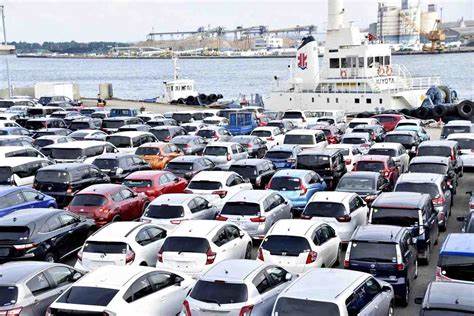Islamabad, Oct 25: Despite the most recent trade restrictions, Japan’s used car exports to Russia have remained strong, underscoring the Russian market’s ongoing need for reasonably priced, dependable automobiles.
Japan continues to be one of Russia’s most important suppliers of old automobiles despite growing international sanctions and logistical difficulties. With exports remaining robust and adjusting to shifting regulations, this continuous trade has exceeded expectations.
High-quality Japanese automobiles are still in demand since “Japan used cars exports to Russia” are still going strong.
The Demand for Japanese Used Cars in Russia
car exports Because of their excellent technology, longevity, and fuel efficiency, Japanese automobiles are highly regarded in Russia. Japanese versions are well-liked in areas with severe weather conditions where dependability is essential due to their excellent construction quality and long lifespan.
Used Japanese automobiles provide Russian consumers with an unmatched quality-price ratio, particularly when contrasted with imports from Europe or the United States. Because of this, Japan has continued to sell old cars to Russia, giving customers who are faced with a decreasing number of options an inexpensive substitute.
Navigating the New Trade Restrictions
Recent sanctions and restrictions have placed constraints on Japan’s trade relationships with Russia, including limitations on financial transactions and shipping logistics.
However, Japanese exporters have found ways to navigate these challenges, adjusting to new compliance standards and establishing alternative routes to sustain the flow of goods.
By adopting creative approaches to logistics, exporters have managed to maintain a significant portion of their business despite the obstacles, ensuring Japan used car exports to Russia remain steady.
Furthermore, Russia has diversified its trade networks in reaction to economic sanctions, frequently interacting with nations who are prepared to overlook certain trade prohibitions. In this regard, Russian consumers continue to be drawn to Japanese automobiles due to their established reputation.
By adjusting to changing legal frameworks and alternate shipping options, both cars’ exports and purchasers have attempted to preserve the consistent flow of used automobiles.
Future Prospects for Japanese Used Car Exports to Russia
Looking forward, Japan used car exports to Russia may continue to face increased regulatory scrutiny, but the market’s resilience is likely to endure.
If further restrictions come into effect, there could be a shift toward indirect trade routes or alternative shipping hubs.
Industry experts predict that Russian demand for Japanese vehicles will remain strong, as consumers prioritize reliability and affordability.
In conclusion, despite the shifting landscape of international trade, Japan used car exports to Russia have shown a remarkable ability to persist.
The durable and efficient Japanese vehicles have a solid foothold in the Russian market, making them difficult to replace even with regulatory hurdles.
The future may bring new challenges, but with adaptability and resilience, Japan’s exporters are likely to find ways to meet the sustained demand. As Russia continues to rely on Japanese vehicles for their cost-effective value, it’s clear that Japan used car exports to Russia are here to stay.
